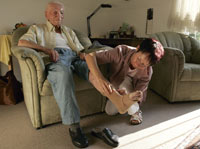
Reablement services must be made more personalised if they are to improve and promote clients’ independence, consultants said today.
Currently, reablement remains a service that is largely “done to” the service user, the consultancies Ambrey Associates and Helen Sanderson Associates warned. “People face too many, uncoordinated assessments and staff are under pressure to meet short-term goals before they “move people on”, their paper added.
The warning is timely given the importance being placed upon reablement services by government, the NHS and local authorities as a way of cutting the costs of long-term care and support. The Department of Health has allocated £150m to the NHS this year and £300m next year to spend on reablement, which involves the provision of short-term support to help people regain independence following a crisis, to help minimise their future care costs.
However, the paper, A New Reablement Journey, found reablement was focused on helping people carry out personal care tasks, rather than meeting social needs, and people who needed support after a period of reablement were often inadequately prepared for the transition to other services.
It said reablement should be reshaped around 10 principles to maximise independence, choice and control, including that:-
• Reablement can be just as appropriate for a younger person with a physical or learning disability as an older person in need of help with personal care tasks.
• People should be able to self-direct the support available to them to achieve the outcome of maximised independence.
• People should have information about the resources available to them and support to plan and make decisions for when their reablement programme ends.
• Relevant information about a person should only be collected once and with their full involvement and consent.
“Maximising independence becomes something that should underpin all social care support and not be confined to age or disability, or to the first few weeks of a person’s journey,” said Jenny Pitts, one of the authors from Ambrey Associates.
The approach is being piloted in Walsall whose executive director for adult social care and inclusion, Paul Davies, said: “More people should have the chance to maximise their independence and have choice in how that is achieved. Reablement is not just about practical self-help; it’s about living life as fully as we can; we have to work holistically to achieve that and have a person centred approach.”
The paper will be available online from Ambrey Associates or Helen Sanderson Associates later today.
Related stories
Fifth of councils illegally charge for reablement services
Reablement delivers better outcomes and savings
What do you think? Join the debate on CareSpace
Keep up to date with the latest developments in social care. Sign up to our daily and weekly emails


 ‘Dear Sajid Javid: please end the inappropriate detention of autistic people and those with learning disabilities’
‘Dear Sajid Javid: please end the inappropriate detention of autistic people and those with learning disabilities’ Ofsted calls for power to scrutinise children’s home groups
Ofsted calls for power to scrutinise children’s home groups Seven in eight commissioners paying below ‘minimum rate for home care’
Seven in eight commissioners paying below ‘minimum rate for home care’
 Facebook
Facebook X
X LinkedIn
LinkedIn Instagram
Instagram
Comments are closed.